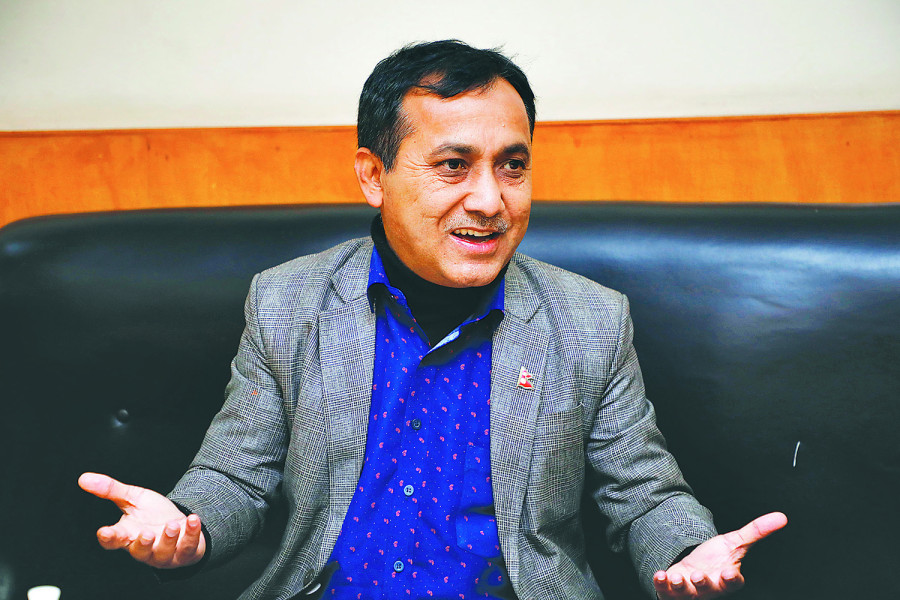Interviews
Bishwa Prakash Sharma: We believe in democracy, so there will be different opinions within the party
The spokesperson of the Nepali Congress on how his party is trying to resolve internal conflicts and how it wants to play an effective role as the main opposition party.
Avasna Pandey
The Nepali Congress is currently suffering from an acute absence of a charismatic leader and organisational unity. With senior members Ram Chandra Poudel and Krishna Prasad Sitaula refusing to attend a Central Working Committee meeting after party President Sher Bahadur Deuba failed to table a work plan to hold the 14th General Convention, factionalism and polarisation has reached boiling point. The grand old party is trapped in partisan interests, which has insulated it from the real issues of the people. The Nepali Congress has wasted the opportunity to present itself as a constructive opposition, often failing to provide a check and balance against the ruling Nepal Communist Party, which is seemingly scuppering democratic reforms. The Post’s Avasna Pandey sat with Bishwa Prakash Sharma to talk about how his party resolves internal conflicts and whether they have done enough to counter the ruling party’s overweening practices.
With factionalism reaching its peak, organisational ailments have cast a damaging shadow over Nepal’s oldest party. Is the party really becoming unmanageable?
A diversity of intra-party opinions actually shows that a party is democratic. The Nepali Congress believes in democracy, so obviously, there will be different opinions in such a party. But yes, it’s important to properly manage such differences.
Indeed, this has been a recurring problem. The leadership is apparently keen on taking decisions unilaterally, without conducting deliberations within the party.
There are two aspects to this issue: one pertains to the internal mechanisms within the Nepali Congress, and the other pertains to the role it plays in larger national politics. In the past too when Girija Prasad Koirala was the party president, there were differences of opinion: about whether or not the Maoists, who were rebelling then, should be integrated into mainstream politics. In the end, we were able to sign the Comprehensive Peace Agreement with the Maoists in 2006. Similarly, factions caused intra-party issues while we were writing the constitution too. Yet, when it came to national politics, the Nepali Congress was able to work with other parties to successfully complete writing the constitution. We did the same regarding the local, provincial and federal elections a few years back. So we’ve always had internal conflicts, but that doesn’t necessarily mean there is no unity within the party.
There is a widespread perception that there is a dearth of leadership in the Congress. Do you feel the same?
There are new leaders emerging all the time. There was a time when the party was led by the charismatic BP Koirala. But it takes time for a new leadership to become mature once the old one is gone. Sometimes, a new leadership’s achievements are overshadowed by the old one’s legacy. Ganesh Man Singh, for example, built on BP Koirala’s legacy. Singh was succeeded by Krishna Prasad Bhattarai, Girija Prasad Koirala and Sushil Koirala. They all helped establish democracy, write the then constitution in 1990, bring Maoists to mainstream politics, and write a new constitution in 2015, respectively. And under Sher Bahadur Deuba, the country was able to hold elections, which helped institutionalise federalism.
So any leadership must be judged in terms of its contribution to national politics. It was possible to end the decade-long insurgency during GP Koirala’s time, but at the same time, the Nepali Congress failed to get the desired electoral results. It’s important to take a middle ground while evaluating leadership. Instead of looking at the current situation as a leadership crisis, it must be viewed as one beset with new challenges that warrant innovative ideas for solving the party’s problems.
Then what prevents the Nepali Congress from promoting to positions of power the handful of young leaders it has left?
BP Koirala actually led the party as a young leader. He became prime minister before he was 50 and so did Sher Bahadur Deuba. In fact, when the party was established, we had many young people who achieved many things as they got older. In recent times, the number of young people joining and leading the party has increased. In 60 out of 77 districts, cadres who entered politics through the Nepal Students Union are now district party chairpersons. We will have even more young people following the 14th General Convention. But it’s important to note that there are two ways through which youths are represented. One is through the issues they raise and the other is by being the face of the party.
Regarding some of the issues raised in the last decade—the constitutional assembly issue or turning Nepal into a republic—our party’s youths were at the forefront. Today too, it’s our youths who take up issues pertaining to the rules of democracy, decentralisation of power and so on. So their representation in terms of raising agendas has been prominent, and after the upcoming general convention, their visibility as the face of the party will increase too.
Speaking of leadership, the by-election results showed patterns of anti-incumbency, but the overall results were largely in favour of the Nepal Communist Party. Why was that so?
Actually, the number of seats retained by the Nepal Communist Party did not change. There are multiple ways to analyse electoral results. For example, the Nepali Congress did lose the by-election for ward chair in Punarvas Municipality in Kanchanpur. We had lost that seat before too. But before, the party was able to get only 78 votes. This time around, we got 310 votes—a remarkable increase. In the past, when the erstwhile Communist Party of Nepal and Maoist Centre fought for the position separately, they were able to get 610 votes in total. But now, the number of votes they have received is less than that sum total. Meaning, the Nepali Congress has narrowed the vote margin. Similarly, in different areas in Dharan and Chitwan, too, our party has increased its vote count.
So if we consider just the number of seats, the Nepali Congress lost one seat this by-election. But we have decreased the vote margin, along with increasing our popular vote count by 7.6 percent. We have fared better than before; that said, the results should have been much better.
Read: The crimes Alam has been accused of are grave, but his party has little to say
Despite promising party’s support for due legal process on the Aftab Alam case, the Congress seems to be protecting him. Why?
We are not providing legal support for Aftab Alam the individual. The Nepali Congress believes in the rule of law; therefore, the party will support the investigation, not the individual. We believe that only the guilty should be punished.
What is your assessment of how the ruling party and opposition have handled the current political milieu?
When the Oli-led government was formed, the conditions were favourable as compared to when governments were formed before. The country is no longer embroiled in an internal conflict, nor do we have to deal with a monarchy. Earlier, Nepal was living through many crises, and because of that to some extent, the citizenry was willing to give the government some benefit of the doubt. But things have now changed for the better and it's time to deliver.
The opposition party is willing to be called a ‘weak opposition’, but, unlike other opposition parties in the past, we will not resort to any kind of destructive behaviour to hinder government processes. In the last two decades, when the Nepal Communist Party was in the opposition, it called for Nepal bandas almost two dozen times. But we as the opposition have never resorted to calling bandas or vandalising public property. The opposition is thus cooperative and the ruling party enjoys a two-thirds majority. And yet, the Nepal Communist Party has not been able to prove itself.
You are equating the allegation of being a ‘weak opposition’ with not being anarchic. That is one way of defining weakness. Any opposition is expected to provide checks and balances to the ruling party, prepare bills and create cross-party alliances to turn them into acts. But your party has been weak in this regard, too.
When people elect parliamentarians, the leaders are being asked to implement the policies they campaigned on. All that we as the opposition can do is find the loopholes in the policies presented by the ruling party, or show them where they’re violating the system when implementing policies. We can generate ideas on policies, but we can't ask the ruling party to choose our suggestions over their policies.
Take for example, the Medical Council Bill. When Sher Bahadur Deuba was the prime minister, an ordinance was passed to accommodate Govinda KC’s demands pertaining to the medical education sector. But the ruling party introduced its own bill, which disregarded all the agreements made in the past. In response, the Nepali Congress obstructed Parliament and demonstrated across Nepal, which led to the government’s acceding to some of Dr KC’s demands. Our party has always kept the interest of the public front and centre, and we try to devise policies accordingly.
You say the ruling party has missed the opportunity of delivering on its promises. But what would your party have done if the roles were reversed?
We would have implemented the agreements reached with Dr KC pertaining to the Medical Council Bill. Regarding connectivity, instead of selling pipe dreams about building new railways, we would have focused on completing the proposed Detailed Project Reports on railways, which would have connected Mechi to Mahakali. There has been an alarming rise in the number of road accidents. The Nepali Congress would have focused on black topping all the roads and maintained all highways periodically to prevent and minimise accidents. Ultimately, we would have set our priorities straight and worked to strengthen institutions, rather than weaken them.




 11.01°C Kathmandu
11.01°C Kathmandu





.jpg&w=200&height=120)






